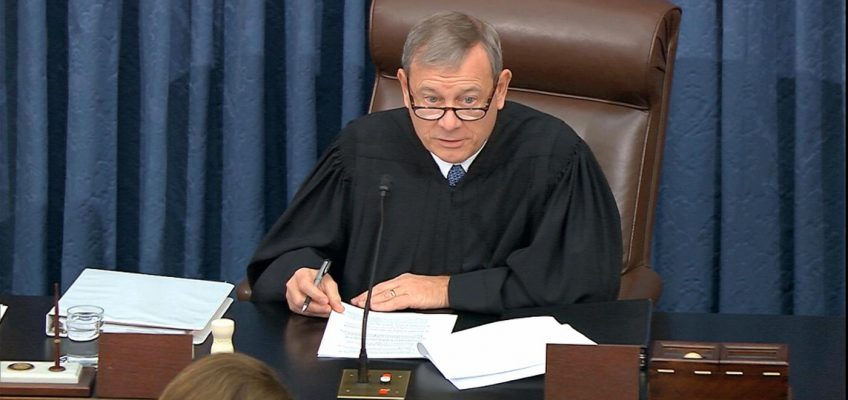Michael Macagnone | CQ-Roll Call (TNS)
WASHINGTON — The Supreme Court closed out a term Monday full of blockbuster decisions on gun control, abortion and criminal charges against former presidents, but legal experts say the most impactful rulings may be those where the conservative majority flexed its influence over federal government actions and policies.
The justices extended their own power over other branches of government and the lower courts, even as they declined to go as far as some Republican-backed litigants and conservative lower courts, those experts say.
Aziz Huq a law professor at the University of Chicago, said the Supreme Court decided most issues in a way that gives them more sway over policies.
“What is distinctive here is that the consequence, the aftereffect, of these decisions is to dramatically increase the discretionary authority of courts, and in particular, the Supreme Court, at the cost of other constitutional actors’ authority,” Huq said.
In four decisions, the justices gave judges more power to review administrative agency decisions, forced certain Securities and Exchange Commission actions to be filed in federal court, allowed challenges to agency rules years after they are finalized and stepped in to pause a nationwide plan to reduce cross-state air pollution.
Clare Pastore, a law professor at the USC Gould School of Law, said the changes from those decisions will reverberate for years to come, encouraging constant lawsuits over both new and existing federal rules, with litigants shopping around for the friendliest judges.
“I think anyone who’s paying attention, can see that the court is engaged in a project of — some would say rolling back, some would say dismantling — the administrative state as much as possible, and the rulings that the court has just issued take us a kind of a stunning distance in that direction,” Pastore said.
Those cases emerged as part of a term filled with major decisions on the structure of federal agencies, abortion, Congress’ taxation power, gun regulation and former President Donald Trump.
In the cases where the court did not rule in favor of conservatives, they did so in a way that avoided a major decision on abortion or other contentious issues in an election year, or avoided a “calamity” such as a ruling that avoided sweeping changes to congressional power to tax, Huq said.
That includes decisions where the justices upheld regulations about the abortion drug mifepristone and chose not to rule on whether Idaho could ban abortions in emergency health care situations.
“The court saved the Republican Party from having, you know, particularly contentious abortion decisions being handed down before an election, but left it open for the court to come back to them a year or so later if a Democratic president wins. So it’s a bit of heads, I win, tails, you lose in those cases,” Huq said.
Administrative law
The court’s conservative majority, ruling 6-3 in three of the four cases, couched its decisions as a necessary step to reassert the judiciary’s responsibility to check the executive branch on Congress’ behalf.
In a decision overturning a 40-year-old precedent for courts to defer to agency interpretations of ambiguous laws, Chief Justice John G. Roberts Jr. wrote that federal law bars the justices from “disregarding” their responsibility to decide what the laws mean.
“Courts must exercise their independent judgment in deciding whether an agency has acted within its statutory authority,” Roberts wrote.
The decision means an uncertain and more difficult path for Congress to shape how the federal government carries out laws on major issues such as the environment, health, immigration and more, lawmakers and legal experts said.
The court’s Democrat-appointed justices have accused the conservative majority of a power grab. Justice Elena Kagan, dissenting in the administrative deference case, accused the majority of “judicial hubris.”
“In one fell swoop, the majority today gives itself exclusive power over every open issue—no matter how expertise-driven or policy-laden—involving the meaning of regulatory law,” Kagan said.
Overall, the decisions will likely mean more court fights over the past and future of administrative rules, according to University of Pennsylvania Carey Law School professor Kermit Roosevelt.
“These decisions work to take power away from the federal administrative agencies and shift power to judges,” Roosevelt said.
Kevin King, a partner at Covington & Burling, said those cases will combine to let judges decide more issues surrounding administrative law and could move many of those court cases out of Washington, D.C.
Stephen L. Carter: Trump might not wind up liking the Supreme Court’s immunity decision
Trump’s immunity ruling sets up ‘mini trial’ before election
Major wins for Trump and stark pullback on regulations mark momentous Supreme Court term
Noah Feldman: Supreme Court social media ruling is a free-speech landmark
The Supreme Court just limited federal power. Health care is feeling the shockwaves
Justice Ketanji Brown Jackson, in her dissent in a decision that allowed challenges to agency rules years after they are finalized, wrote the that court’s decisions would combine to unleash a “tsunami” of lawsuits objecting to long-standing federal rules.
“Doctrines that were once settled are now unsettled and claims that lacked merit a year ago are suddenly up for grabs,” Jackson said.
Still, the justices declined to go as far as the conservative-leaning U.S. Court of Appeals for the 5th Circuit had in several major issues.
The justices reversed decisions from that court that would have invalidated a federal law banning certain domestic abusers from possessing guns, restricted access to medication abortion, invalidated a part of the 2017 tax law and rendered unconstitutional the funding structure for the Consumer Financial Protection Bureau.
Those were some of the court’s most contentious cases, and Roosevelt said they showed the court’s intended focus.
“There are some things the Supreme Court is not willing to do, at least not yet, and maybe not ever,” Roosevelt said. “It is a question of how far they are willing to push it.”
Trump and election
The Supreme Court’s most prominent case this term dealt a serious blow to the criminal case brought by special counsel John L. “Jack” Smith alleging Trump attempted to overturn his loss in the 2020 election.
Monday’s decision almost ensured that Trump will not face trial in that case before the 2024 election, as it sent the issue back to the trial court to decide whether the indictment covers Trump’s “official” acts as president.
Even in the Trump case, where the justices said presidents have a broad immunity to federal charges, Jackson pointed out in her dissent that the justices had given themselves the role of “gatekeeper” to decide whether a president could face trial over official acts outside the “core” of his presidential duties.
Huq said the decision may have done long-term damage to the country and it is difficult to see how it would be rolled back. He pointed out that even in its decision, the justices did not engage with the consequences of presidential immunity, such as the implied ability to order political assassinations.
“It’s really striking how the majority, in that case, you know, an openly or a self-evidently partisan majority, responds to those concerns with essentially nothing,” Huq said.
For next term, the justices have already started taking controversial cases, including fights over access to gender-affirming care for minors, the Food and Drug Administration’s ability to regulate e-cigarettes, and access to pornography websites in Texas.
The justices could take up more contentious issues, such as gun regulation, the viability of Georgia’s state case against Trump and more in the coming months.
©2024 CQ-Roll Call, Inc., All Rights Reserved. Visit cqrollcall.com. Distributed by Tribune Content Agency, LLC.




